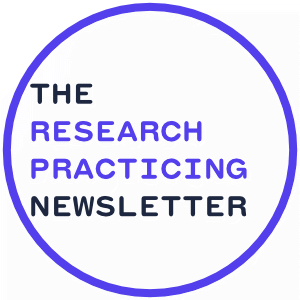📕 A WeWork story and a book update
Hello!
This is the latest Research Practicing newsletter by Gregg Bernstein. Thank you for subscribing.
I love a good prompt. If there’s anything you’d like to see me cover in a future dispatch, get in touch!
Now here's what's hot off the presses this week at gregg.io:
Thanks to everyone who signed up for this mailing list. I promised a WeWork story in the subject line, but first I want to share some updates about Research Practice.
What is this Research Practice book all about?
My north star for this project is that this is the book that every HCI, UX, and interaction design student will read to understand what applied user research really looks like, based on the stories and experiences of the people who work in this field.
Research Practice captures the day-to-day of the practice of user research for product organizations. From how to get started to scaling a team to working with designers to making tradeoffs thoughtfully, this book comprises the spectrum of user research practice experiences.
How’s the book shaping up?
The book features 75 essays and interviews from 40 research leaders and practitioners. The broad questions the book addresses are:
Who practices user research?
What is the territory of user research?
How do user researchers integrate with their organizations?
What is the day-to-day of user research practice?
How do you build awareness of user research in your organization?
How do you scale your user research practice?
What’s hard about user research?
What happens after user research?
Among the many contributors to the book are Nikki Anderson, Matt Arnold, Kathleen Asjes, Marianne Berkovich, Aras Bilgen, Dylan Blanchard, Janine Coover, Snigdha Diehl, Lindsey Ferris, Jess Greco, Lauren Isaacson, Christiana Lackner, Michael Morgan, Sarah O’Donnell, Roy Opate Olende, Krista Plano, Stephanie Pratt, Amy Santee, Asha Scott-Morris, Noam Segal, Ane Sharma, Kelly Silver, Janelle Ward, Alex Wright, and Jesse Zolna.
The final few essays are rolling in now; I’m wrapping up copy edits, locking the content, and working with editor Nicole Fenton on the book flow.
I have ideas—is there a way for me to contribute?
Yes! Some of the topics would benefit from additional perspectives. If you’re a ux/user researcher and want to contribute, you can do so by answering some open-ended questions in this survey: https://greggcorp.survey.fm/practitioner-survey
Cool! But why didn’t you just ask me to participate in the first place?
Hang on, my connection is bad and I lost you for a second. Let’s just move on…
Is it true that you were briefly employed by WeWork between your roles at Mailchimp and Vox Media?
With WeWork in the headlines recently for all the wrong reasons, this seems like as good a time as any to tell a WeWork story…
I joined WeWork in January, 2016 as their UX research manager. I love studying how people work, what collaboration looks like, and the systems that support both. This role felt like an opportunity to tackle those topics across digital and physical experiences. (Yes, I know I was wrong. With apologies to Mike Birbiglia, I’m in the future also.)
The thing is, I knew I might have made a huge mistake in joining WeWork about 5 minutes into my tenure. Roughly 30 people were in my orientation cohort at corporate HQ in New York. From what I could gather, they had about 30 to 50 people starting every Monday.
“How was orientation?,” you ask. Good question! Neither I, nor anyone else, could hear much of what anyone said during orientation… because they held orientation at a table in the common area—the same area where they serve coffee, beer, fruit-infused water, and a curated playlist of music just loud enough to compete with any conversation. The place was packed with dozens of people speaking loudly enough to be heard over the music. Which meant that the HR team was trying—unsuccessfully—to talk over the people loudly talking over the music.
“Could we move orientation to a conference room?”, someone asked. No—none were available. For a company thinking about the future of work, this seemed problematic.
Then: icebreakers! The head of HR insisted we each yell our names as if we were being announced at a baseball game. Then the others in the cohort were instructed to whoop, cheer, and clap, further extending the “at a baseball game” scenario. As a quiet person, this was my hell.
The head of HR then insisted we break into groups of 10, form a giant circle, and play the “human knot” game. You play by joining each of your hands with a different person’s hands across from you, and then collectively figure out how to untangle everyone into a circle of people facing one another—without anyone letting go. Games are usually fun; ergo I don’t think this qualifies as a game. For a quiet person who also doesn’t want to touch anyone, hell showed that it had some tricks up its sleeve.
I resigned seven weeks later, though not entirely because of the orientation experience. But that would have been reason enough.
Other news
I’ll be speaking again at User Research London this summer. I was part of the inaugural event in 2017, and it was a thrill to be around so many members of the research community—definitely one of my favorite conference experiences. If you’re attending, please say hi.
Onward,
Gregg
- Want to offer feedback or a suggestion for a future issue? Hit reply or get in touch here
- Access all my content on my website, gregg.io
- Buy my book, Research Practice

